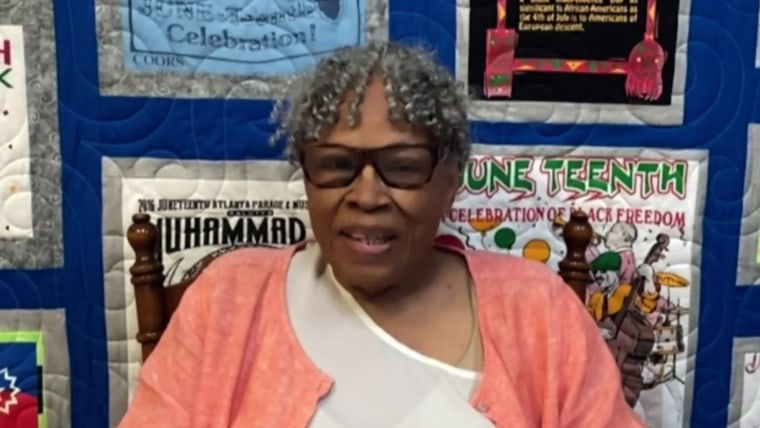For many Americans, Juneteenth, which commemorates the end of legalized slavery in the U.S. on June 19, 1865, is a time of jubilee. And since President Joe Biden signed legislation in 2021 to make Juneteenth a federal holiday, others welcome it as a day of rest.
This Juneteenth is an opportune moment to consider the bill calling for $14 trillion in reparations for Black Americans.
However, Juneteenth should be more than a day of rest or celebration. It should be a somber day to reflect on the unique challenges Black people have faced in this country — and a day to emphasize the need for national atonement. This Juneteenth is an opportune moment to consider the bill Rep. Cori Bush, D-Mo., introduced last month calling for $14 trillion in reparations for Black Americans.
Bush was right when she said at a news conference that “the United States has a moral and legal obligation to provide reparations for the enslavement of Africans and its lasting harm on the lives of millions of Black people. America must provide reparations if we desire a prosperous future for all.”
While critics argue that it’s too late to offer reparations, the push for reparations is almost as old as the country itself, and Bush’s legislation is just one of the more recent attempts to get recompense for slavery and the decades of discrimination, segregation and racist policies that followed.
There will be a need for recompense as long we continue to witness the legacies of slavery in the United States. Despite the many political gains and triumphs over the years, racism and white supremacy persist in all aspects of American life and culture.
The average Black family’s wealth in the United States is only one-tenth of the average white family’s, a wealth gap tied directly to slavery. Black Americans experience poorer access to health care and lower quality of care than any other racial group. Black students lag behind their white peers, not for lack of talent or ability but because of decades of structural inequalities that have impeded their success. From police violence and mass incarceration to voter suppression and unequal access to housing, the social and economic disparities that shape contemporary Black life are all legacies of slavery.
For centuries, African Americans have been demanding reparations—sometimes in the form of actual payments and other times in the form of programs and resources.
For centuries, African Americans have been demanding reparations — sometimes in the form of actual payments and other times in the form of programs and resources that help improve the socioeconomic conditions of Black people in the United States. Belinda Sutton, a formerly enslaved Black woman in Massachusetts, petitioned the Massachusetts General Court in 1783 in an effort to receive a pension from the estate of her deceased former owner. At its core, Sutton’s petition was a demand for reparations. She referred explicitly to her years of unpaid labor.
In the aftermath of the Civil War, Callie House led a campaign for reparations through her organization, the National Ex-Slave Mutual Relief, Bounty and Pension Association. From John Wayne Niles in the 1880s to Audley “Queen Mother” Moore during the 1960s, Black leaders have been demanding that the country acknowledge and make good on its debt. In recent years, organizations such as the National Coalition of Blacks for Reparations in America have been on the forefront of that movement.
Bush isn’t the first federal lawmaker to take up this cause. Since 1989, Black lawmakers — first the late Rep. John Conyers, D-Mich., and now Rep. Sheila Jackson Lee, D-Texas — have introduced a version of H.R. 40: Commission to Study and Develop Reparations Proposals for African Americans Act in the House. The legislation, which takes its name from the “40 acres and a mule” promise, would establish a commission “to consider proposals for reparations for African American descendants of slavery.”
In 2021, for the first time in 30 years, the bill was voted out of committee. But it hasn’t gone any further than that.
Bush is calling on the federal government to do more than establish a commission.
Bush is calling on the federal government to do more than establish a commission. Reparations researcher and advocate Dreisen Heath, who co-authored Bush’s legislation, told me that the new proposal offers “a comprehensive and holistic framework for reparations for the legacy of slavery that has never been entered in the congressional record prior.”
“For over 30 years,” Heath said, “the federal government has actively blocked merely a study and recommendations on the issue of reparations for Black people via H.R. 40, but yet the federal government has routinely paid reparations to white veterans exposed to toxic waste waters, 9/11 victims and other injured, non-Black communities.”
Heath argues that it is “never too late to repair state-sanctioned violations.” She’s right. If the federal government can provide reparations to others who were obviously harmed, then it can do the same for African Americans. As the nation commemorates Juneteenth as the end of slavery, there is no better time to advance Bush’s bill and to take the necessary steps to repair the harm slavery caused Black people and to address the aftereffects that endure.



